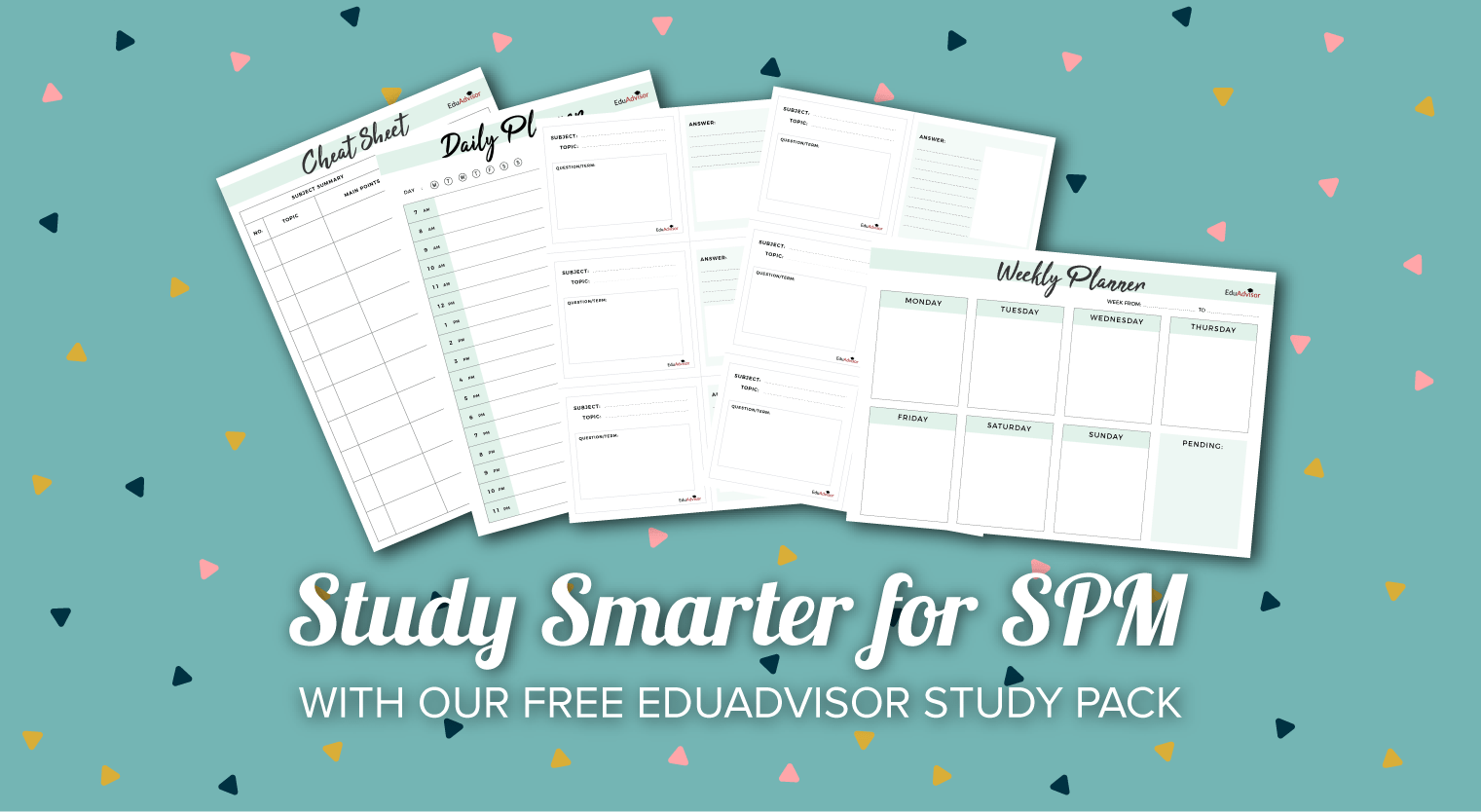One Month Before SPM: 8 Surefire Strategies for Success
With SPM only a month away, there’s no time to dilly-dally! Here are 8 ways to maximise the month before your big exam.
Updated 31 Jan 2023

With SPM only a month away (yes, a month!), there’s no point standing in the corner, shaking in your boots. It’s time to buckle down and get to work, now!
We’ve curated 8 suggestions on how you can maximise the month before your SPM, complete with cool printable study planners for you to use! Let’s get started.
#1. Scrutinise your exam timetable

Your first order of business is to examine your SPM timetable to ensure you know when your exams start and end. You may want to keep a countdown of the days left to your exam as a scare tactic motivation for you to begin revising if you haven’t already.
Highlight the subjects that you’ll be taking and take note of the date and time to help you identify which subjects come first. This will help you create an effective study plan and prioritise your subjects accordingly.
#2. Get organised

Create a conducive study environment by finding a place where you can comfortably study for long hours without distractions. This means putting away your phone and making sure your mischievous siblings are occupied!
Next, make sure you have all the resources you need within reach. You can keep your textbooks nearby and organise your notes according to their chapters for easy reference. Ensure your writing tools and calculators are with you too.
Write down the examinable chapters for all your subjects to avoid forgetting anything important. Once you have everything laid out, all that’s left to do is to pencil them into your study schedule.
PRO TIP
Get organised with our EduAdvisor Cheat Sheet. You can use this Cheat Sheet to write down the topics you have to study for each subject along with the main points. Then, review it on the day before the exam!
#3. Devise a study plan

We know what you’re thinking.
“I’m never going to stick to a study plan. There’s no point!”
But hear us out!
Creating a study plan will break your workload into bite-sized tasks, making your goals easier to achieve.
A great way to start is to use a daily or weekly planner. Block out the times you’ll be in school, attending tuition classes and having your meals. From there, you’ll be able to visualise how much free time you have left and can then start slotting in your study chapters in your daily or weekly planner.
Don’t forget to allocate some leisure time, such as an hour to watch your favourite TV programme, or for a game of futsal in the evenings. A realistic timetable will mean that you are more likely to adhere to it.
At the end of the day, review your list to see how much you have accomplished. This helps you keep track of your daily targets and will keep you motivated to stick with your schedule. At the same time, plan out the following day’s to-dos as well. Scheduling your next day’s tasks will give you clarity on what needs to be done and allow you to start your day on the right foot.
PRO TIP
Don’t know where to start? Just download our super user-friendly daily or weekly study planner to put these timetabling tips into practice!
#4. Review and revise

Now that you’re ready to rumble, break out the findings from the post-mortem you conducted on your trial results and start troubleshooting. For example, you can go over your weak chapters or re-evaluate your study methods and adapt accordingly.
However, if you’re still forgetting key information even after going through your exam materials numerous times, don’t be discouraged! You still have time to re-learn the chapters you have forgotten since finishing your trial exams. This time, instead of cramming tonnes of information in one sitting, try spaced practice instead.
PRO TIP
Once you’ve added all your topics into the Cheat Sheet, don’t forget to tick the boxes once you’ve reviewed it, as this will help you keep track of each topic you’ve mastered.

#5. Put your knowledge to the test

Once you’ve refreshed your memory through revision, it’s time to attempt worksheets and past-year questions. This retrieval practice will help reinforce the information you’ve learnt. If you’re pressed for time, you can also look up the correct answers when attempting past-year questions and commit them to memory.
Time yourself while doing past-year questions to get accustomed to writing under exam conditions. Soon, completing an essay in 45 minutes will become second nature!
Got Your SPM Results?
Upload your SPM results and get a list of personalised scholarship offers — instantly.
Start Now#6. Make a date with your teacher

If you’re struggling with a particular topic, it’s best to make an appointment with your teacher to help you understand the subject better.
Choose a time when you’re both free and write down all your questions to ensure you have a fruitful discussion. Your teacher is more than likely to oblige meeting you, but be sure to do so 2 or 3 weeks before the exam as many students will be bombarding them at the last minute.
PRO TIP
At this point in time, it’s important not to skip school too often to study at home! You might miss out on last-minute exam tips and valuable guidance from your teachers.
#7. Partner up

Grab a friend or 2 and form a study group. You can take turns playing teacher by explaining topics to each other.
Studies show that teaching others enhances our own learning as well as encourages us to organise our knowledge and improve our understanding of the subject.
Studying with your pals can also boost your motivation and act as a change of environment to help you study. It may also raise your sense of accountability, prompting you to prepare beforehand to participate in the discussion.

#8. Take a chill pill

In the midst of all the hustle and bustle of your exam prep, be sure to squeeze in some time to relax as you cannot afford to burn out before your month-long SPM exam. So take the time to listen to some music to unwind or have coffee with a friend over the weekend.
If it’s not already part of your lifestyle, start cultivating healthy habits. Exercising 30 minutes a day and chowing down on brain food can keep the juices flowing and boost your immunity.
Keep in mind that stress can make you susceptible to illness, which makes it important for you to get sufficient rest. As exam fever heats up, the last thing you want is to be plagued by the pesky flu. Don’t forget to get enough sleep too — you’ve got a long fight ahead of you and you don’t want to arrive at the battleground sleep-deprived.
So, remember, the trick to acing an important exam is to start early and study consistently. It involves a lot of hard work and determination, but we can assure you that your future self will thank you! All the best!






